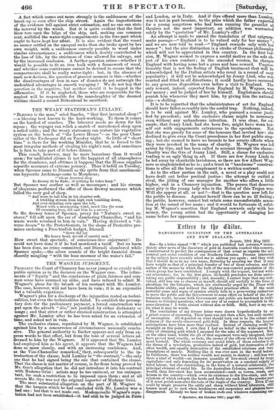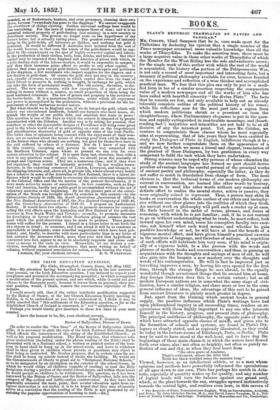rettero to the Mar.
DANGEROUS CONDITION OP THE AUSTRALIAS AND NEW ZEALAND.
Reigate, 12th May 1852.
Sin—In a letter signed "W." which you published last autumn,* imme- diately after news of the discovery of gold in Australia reached this country, I endeavoured to predict the consequences of that event as regards the eco- nomical and social condition of our Southern Colonies. Persons interested in the subject have recently asked me to address you again ; and they wish that I should do so in my own name, flattering by assuring me that it may have weight as that of a principal founder of two of those colonies, and the author of the means by which the bulk of the non-convict population of the whole group has been established. I comply with the request, but not with- out reluctance ; for, in the first pisce, ill-health precludes me from under- taking any public responsibility ; and, secondly, I cannot hope that any indi- vidual, still less one so obscure as myself, should add usefully to the force of pleadings for the Colonies, which are continually urged by the Times with remarkable ability, and without the slightest practical effect. If the most powerful cause and organ of opinion utterly fails in a persevering endeavour to move the public and the Government to some effort on behalf of the Aus- tralasian world, because both Government and public are hardened in indif- ference to Colonial questions, what can any of us expect to accomplish in the same direction ? I write almost without aim or faith. Still, here is my say, for what it may be worth. The conclusions of my former letter were drawn hypothetically by an a priori course of reasoning. Their basis was not then a fact, but only matter of assumption. All depended on what should turn out to be the extent and richness of the newly-discovered gold-field. In these respects, the largest anticipations have been more than realized. Instead of claiming credit for foresight on this point, I own that I had no belief in the wide-spread fa- cility of obtaining gold which I assumed for the sake of the argument But, on the other hand, whilst the ifs of that argument were only imagined, they have proved most exactly, as facts, the causes of the effects which the argu- ment foretold. The whole economy and social fabric of these colonies is in the throes of a revolution, productive indeed of gold, but destructive of all other wealth, and equally destructive of the established relations and very foundations of society. Nothing like it was ever seen in the world before. In California, there was neither wealth nor society to destroy ; still leas was there a kind of wealth—an immense quantity of live-stock owned by large capitalists—not only depending for its preservation on a constant supply of hired labour, but also constituting, in the form of a natural aristocracy, the principal element of social life. In the Australian Colonies, moreover, other wealth than live-stock has been accumulated—such as towns, roads, and houses in the country—which owes its existence to the live-stock, and the relations of which towards the herds and flocks are such that the greater part of it must perish soon after the ruin of the staple of the country. Even if one could by magic preserve the cattle and sheep without hired labourers, still houses must go to rack when bricklayers and carpenters and glaziers have disappeared. Already we hear of broken roofs and windows remaining • Spectator, 4th October 1851; page 947. mended, as of flockowners, bankers, and even governors, cleaning their own shoes, because "everybody has gone to the diggings." We cannot exaggerate the overthrow of things existing. Sudden universal suffrage here would be less convulsing. For the laws of nature surpass those of man ; and it is an essential natural property of gold-finding (not mining) in a new country to Awobinize society. 'fhe process no longer rests on the hypotheses of my former letter, but is actually taking place. The greatest reward of industry being in the gold-fields, all labourers go thither, and nothing but gold is produced. It would be different if Australia were isolated from the rest of the world, because, in that case, the wants of the gold-finders would be sup- plied by the employment on the spot of highly-rewarded capital and labour, in the production of their clothes, tools, food, drinks, and tobacco. But their capital may be imported from England and America at prices with which, in a gold-finding state of the labour-market, it would be impossible to compete ; and thus their immense gains afford no profits to any other capital. It follows that none gain except gold-finders, small storekeepers and publicans at the diggings, a few merchants who import supplies for the diggers, and a few dealers in gold-dust. Of course the gold does not stay in the country ; and, equally of course, to a country in which capital dies from the want of hired labour to preserve it, nothing is brought, in exchange for gold, which can take the form of permanent wealth. The old society, therefore, is dis- solved. The new one consists, with few exceptions, of a sort of navvies rolling in money without a master, no small proportion of them being the most hardened criminals. The law of person and property is the revolver or the bowie-knife. It is a monstrous Socialism, under which all enjoyment and power is monopolized by the proletaires, without a provision for the im- provement of their barbarous second nature. But what should we in England care, if we do but get the gold, which will relieve our encumbered landlords, benefit our farmers who have leases, di- minish the weight of our public debt, and establish free trade in peace ? This question is one of the ways in which the subject is disposed of by people unconnected with the Colonies. Another way is by taking for granted, that somehow or other the inscrutable designs of Providence will bring some great good to the whole world out of so astonishing an event as the long-delayed and simultaneous discoveries of gold at opposite aides of the wide Pacific. The latter class of optimists being content with the enjoyment of their won- ders, are as careless about the means of drawing good from evil in this case, as the former class who already see nothing but good for themselves here in the evil suffered by others at a distance. Nor do I know of any class in this country, excepting only persons in some way connected with the Southern Colonies, upon whom at present we can rely for even serious attention to the subject. It is upon these last., therefore, that, with a view to any practical result of any value, we should press the necessity of prompt and vigorous action. They are a numerous class; and if they were but organized, they would be instantly powerful. In our woollen manu- factures, in the exporting commerce of London, Liverpool, and Glasgow, in the shipping interests, and, above all, in private life, where almostevery family has a relative in some of the Austias or New Zealand, there is a latent in- fluence which would be sufficient to overcome the anti-colonizing dispositions of the Colonial Office and the via inertias of the general Government, if it were made active by means of association. In free countries, such as Eng- land and America, hardly any public good is accomplished without the aid of voluntary societies at the beginning. By far the greater part of the coloni- zation of the South was brought about by societies in this country—by the Colonization Society of 1830, the South Australian Association of 1832-4, the New Zealand Association of 1837, the New Zealand Company of 1839-46, and the Canterbury Association of 1848-52. I propose an Australasian Society. It would have two objects : first, to promote measures for counter- acting the evil effects upon the Australias and New Zealand of the gold-dis- covenes in New South Wales and Victoria ; secondly, to promote measures for developing in favour of the whole Southern group of colonies the vast good which the gold-discoveries may be made to produce. These general terms will suffice for the present. I intend in a future letter to set forth the two objects in detail ; to examine, and I am afraid it will be to condemn as unavailable or inadequate, some remedial suggestions which have been pub- lished; and, finally, to describe with more particularity than in my letter of last autumn the measures which, more than ever now that hypothesis is converted into fact, appear to me to be absolutely requisite and alone suffi- cient as means to the ends in view. Meanwhile, let me declare a con- viction, resulting from much experience, that mere writing on behalf of colonies, without organized association for action, is like beating the wind. I remain, Sir, your obedient servant, E. G. WAKEFIELD.



























 Previous page
Previous page